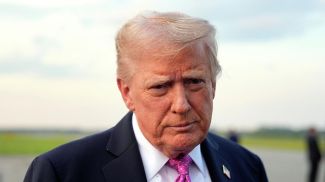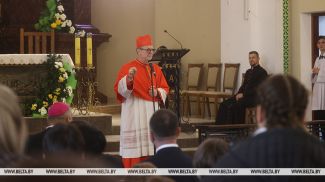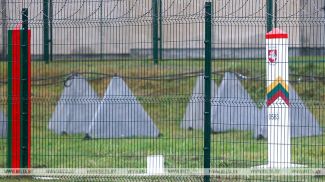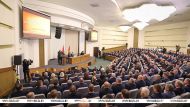MINSK, 21 June (BelTA) - Western sanctions are likely to be linked not to some political issues, but to the fact that the economy of Belarus has survived, while Europe has suffered huge losses due to the lockdown, Belarus' Economy Minister Aleksandr Chervyakov said in an interview to the ONT TV channel, BelTA has learned.
According to Aleksandr Chervyakov, Belarus takes the sanctions of the West calmly. “On the one hand, it is a challenge, but on the other hand - an opportunity for our economy to look at new markets and new partners from a different angle. We are quite actively working in this direction. Our plan, and there is a lot of talking about it now, is aimed at developing new markets. This is a turning to Asia,” he said.
In this case, of course, there will be some losses due to the redirection of the goods flows. “These costs can make up to 3% of GDP at one time. This pertains to those commodity items and groups against which sanctions have been imposed,” the minister added.
To compensate for these losses, there will be an urgent need to work hard on the domestic market, including on reducing production costs, and on import substitution.
During the general lockdown, Belarus did not close down, and enterprises managed to keep momentum. Although there were problems with cargo transportation and sales in certain areas, people kept working and did not lose their competence.
“Probably one of the reasons why sanctions have been imposed now, in our opinion, is that economic issues were hidden under the pretext of the political ones. If we analyze the global experience of applying sanctions, none of the sanctions have achieved their political goals. But those sanctions have been hiding other things - issues related to the division of markets and the pushing out of competitors. We can see the same processes against Belarus today,” Aleksandr Chervyakov said.
He said that even before the adoption of sanctions, there was a lot of talking around the Belarusian nuclear power plant with calls for not buying electricity from Belarus, banning its exports. After the lockdown, these processes intensified, because Belarus was able to mobilize quickly, including by pulling in passenger traffic in the air transport sector.
A plan of countermeasures has been developed to protect the country's interests. Nevertheless, Belarus still hopes for pragmatism from its Western partners and believes that they ‘would press the stop button and suspend all the actions against our country'.
“The growth in January-May 2021 reached 3.1% and made up for the decline in 2020. In 2019, a fairly successful year, we posted an increase of 1.2%. The economy worked well. This shows that we have potential. The momentum we had in 2020 gave us the opportunity to enter markets in which our competitors lagged a little behind. In addition to it, the state continues to fulfill its social obligations. Economic stability was predetermined by the decisions made by the head of state in 2020, which was not to put the economy on hold,” he said.













